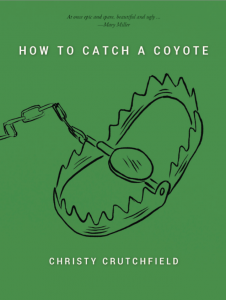208 pages, $14.95
Review by Michelle Dove
The multi-perspective novel isn’t new. Think Middlemarch and To the Lighthouse, for starters. But multi-perspective novels have populated the literary mainstream in recent years, some with shifts as complimentary to the text as Juno Díaz’s The Brief Wondrous Life of Oscar Wao or as gimmicky as Colum McCann’s Let the Great World Spin. For better or worse, multiple perspectives are marketable in today’s attention-waning culture, where the worse often sacrifices an engaging form for mediocre content. In truth, authentic narrative switches within a novel aren’t so easily pulled off. Perspectives must be similar enough in intent and content for cohesion, but also distinct enough to warrant their inclusion. And while I don’t know if Christy Crutchfield initially set out to write How to Catch a Coyote from multiple perspectives, I know that the narrative shifts in her debut novel feel as natural and necessary as the setting in Lafayette, North Carolina. And place in Crutchfield’s novel is crucial.
As the novel unfolds, I find myself in an increasingly recognizable world of my youth: a small American town where waitresses “rolled silver and complained about customers asking for their numbers,” where “two-thirds of these girls dye, highlight, Sun-In their hair,” where teenagers “pass around a water bottle filled with Aristocrat and orange juice” in the town square. Crutchfield brings this contemporary south to life in succinct, potent details, and the tone here is anything but judgmental. There’s a tenderness given to the scenery and townspeople, one so delicately rendered it’s evident Crutchfield knows both the trappings and blessings of rural life. The result is an authentic account of an American family whose trials of divorce, parenting, and sibling rivalry/affection surfaces through each family member’s narrative. The imagination of How to Catch a Coyote thus resides less in the characters or story, both of which ebb alongside a sadness that’s neither melodramatic nor escapable, and more in the story’s telling. Beyond the measured reveal of each character, it’s Crutchfield’s precision in language that enlivens this world and challenges us to look carefully, interrogate farther. Continue reading
![[PANK]](https://pankmagazine.com/wp-content/themes/pank/assets/images/pank-logo-large.png)


